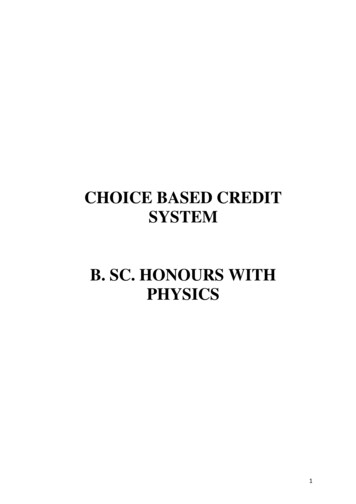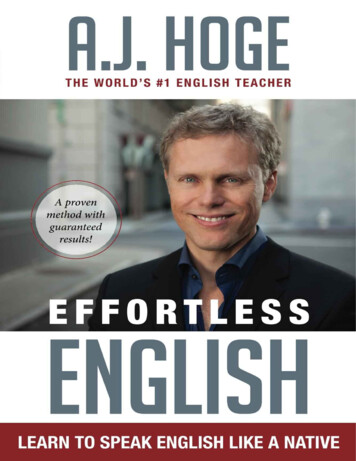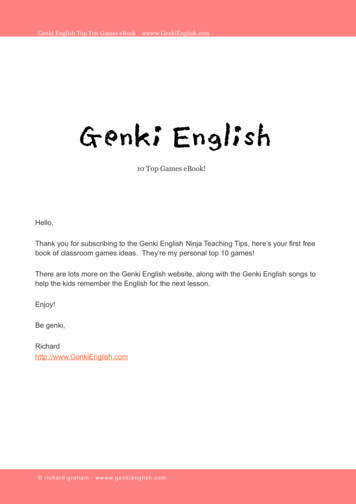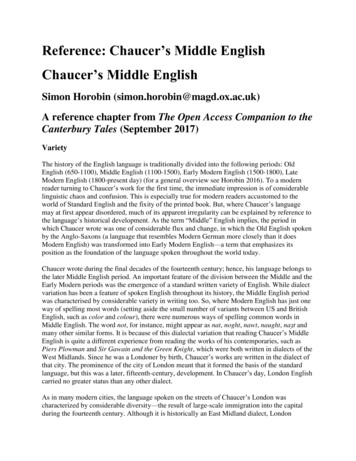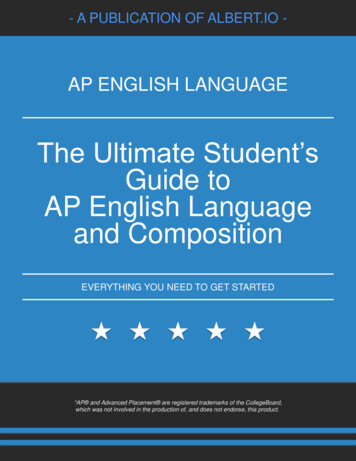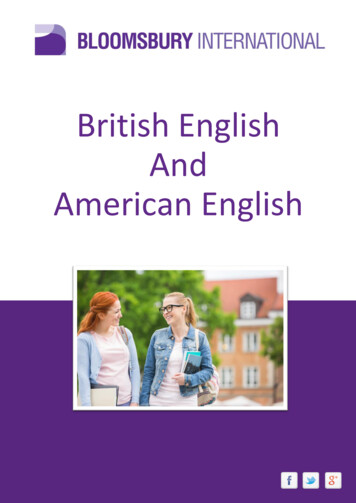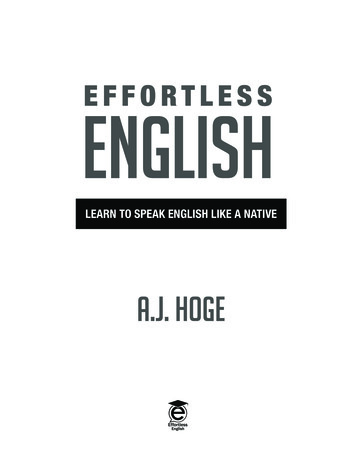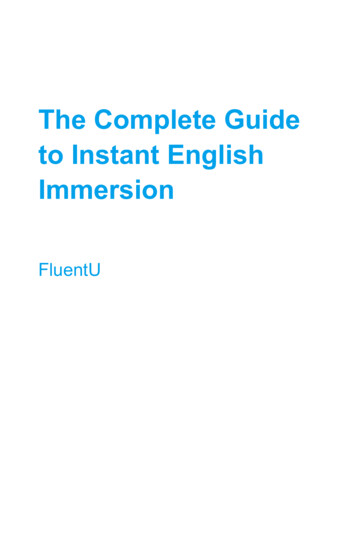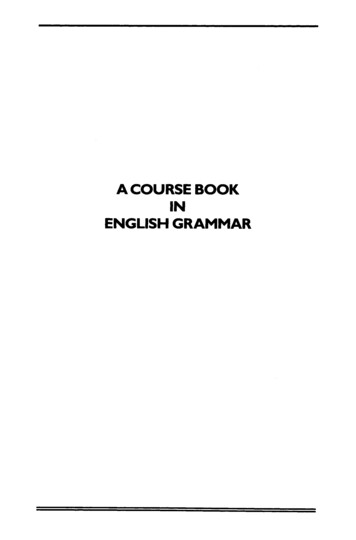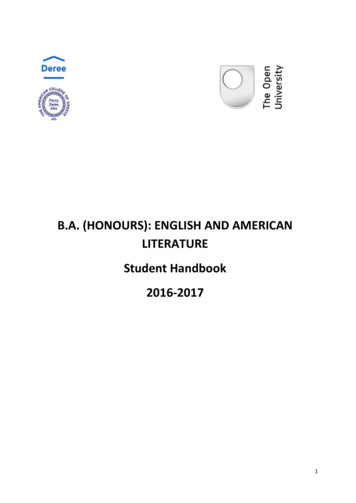
Transcription
B.A. (HONOURS): ENGLISH AND AMERICANLITERATUREStudent Handbook2016-20171
ContentsWelcome by the Dean of School of Liberal Arts & Sciences . 3Welcome by the Department .4DEREE-The American College of Greece .4Mission Statement .4Educational Aims .5Learning Outcomes .5Programme Description .6Programme Structure .8Progression from Level to Level .11Teaching and Learning Methods .11Assessment .12Turnitin 12How We Assure the Quality of the Programme .12The Role of External Examiners .13Teaching Staff and Contact Details .13Career/Post-Graduate Opportunities .14English Society .15Academic Integrity .15Library .15Laboratories.18Academic Advising . 18Student Academic Support Services (SASS) .19Useful Information & Links .19Assessment Mapping 21-24Indicative Student Time Table 25Appendices 272
Welcome to the ProgrammeMessage from the DeanIn a time when many colleges and schools of liberal arts are under siege by politicians, financialorganizations, parents, and even educators from professional schools, one might be tempted to askwhy one would send a son or daughter to study the Liberal Arts. What possible reason might existfor the continuation of such an outmoded curriculum? The standard response is that the Liberal Artsprovide the student with critical thinking ability along with oral and written proficiency with asprinkling of numeracy that is necessary to have success in the rapidly changing globalized economyand diverse world in which they will soon be competing. And while there is some truth in thisresponse, somehow it fails to encapsulate the essentials of the Liberal Arts education: it soundsalmost defensive.There is no argument that the liberal arts and sciences set the foundation for engaged citizenship,for scientific and mathematical inquiry, and for professions where communications and criticalthinking skills are embraced. But to see the study of the liberal arts only in these terms is to overlookits more profound aims: firstly, to promote joy and inspiration through the learning experience itengenders. On one hand, Liberal Arts studies opens one’s mind to embrace the alien, theunthinkable, the impossible while at the same time offers the discipline necessary for an orderedintellect which permits one to compete in “the modern market place of ideas” as Keith Krolldescribes our contemporary world in his Fostering the Liberal Arts in the 21st Century.What is seldom highlighted in discussions concerning the essence of Liberal Arts courses anddegrees is that they provide a measureable intellectual distance from mundane and habitualaspects of everyday life. It is within this primordial garden of ideas that the student is able to playwith new concepts without being held hostage to their relevance in the future. In the spirit of JohanHuizinga’s Homo Ludens, the liberal arts students can make value choices from their studies; he orshe can experiment with identity, character, or actions from both an intellectual and emotionalstance. This “playing” is essential in all intellectual pursuit whether it be in between the “interplay”of speech and language or that of matter and the mind; this is where the sparking of knowledge isdiscovered. This is where the Liberal Arts resides: here in School of the Liberal Arts and Sciences atthe American College of Greece.Patrick J. M. Quinn, PhDDean, School of Liberal Arts & Sciences3
Welcome by the DepartmentThe Faculty of the Department of English and Modern Languages welcomes you to your newmajor and promises you an exciting, rigorous, and fulfilling academic experience.The purpose of this handbook is to offer you guidance and advice as you begin your intellectualjourney in the B.A. (Honours) in English and American Literature programme. The handbookcontains essential information about your course structure, assessments, modules, and muchmore. Take time to review these pages.We welcome you and wish you an enriching academic experience and a successful future career!DEREE-The American College of GreeceThe American College of Greece (ACG) is a US non-profit institution. The educational system atDEREE-ACG is based upon that of American institutions of higher learning. The school provides itsstudents with a quality education of a standard equivalent to that of the most respected collegesand universities in the United States by virtue of its accreditation by The New England Associationof Schools and Colleges (NEASC), the oldest accrediting body in the United States.In 2010, DEREE-ACG entered into a partnership with The Open University of the U.K., the largestuniversity in Europe, for the purpose of programme validation. All twenty-eight undergraduateprogrammes offered at DEREE-ACG are validated by The Open University, UK(www.open.ac.uk/validate).Through these accreditation and validation relationships, DEREE-ACG students undertake studiesleading to the award of two degrees: a US Bachelor’s degree, reflecting institutional accreditationby NEASC, and a UK Honours Bachelor’s Award validated by The Open University.Mission Statement:The B.A. (Honours) in English and American Literature offers students exposure to a variety ofliterary texts, cultures, and ways of thinking and analyzing. Students will read a wide range ofengaging works of fiction, poetry, drama, and non-fictional prose from the U.K. and the UnitedStates as well as from around the world. They will learn to interpret these works from a variety oftheoretical perspectives and develop an understanding of literary history. Emphasizing academicdiscourse and research methods of the discipline, the programme prepares students for graduatestudies. By providing training in a broad range of skills and competencies, the programme alsoprepares students for a variety of professions.4
Educational Aims:The aims of the B.A. (Honours) in English and American Literature programme are to enablestudents to:ooooooooread insightfully a wide variety of literary texts in English from about 1500 to the present;understand the variety of critical and theoretical approaches to the study of literature;develop skills of analysis and interpretation of literary texts;understand the significance of theoretical approaches to the study of language;understand the functions of language and linguistic concepts;recognise language “problems” and develop problem-solving strategies;analyse and manipulate data from a variety of languages;develop, to a high degree of competence, a range of communication skills (oral andwritten) which are at once subject-specific and transferable, and will prepare students fora wide variety of professions;o conduct research using both print and electronic sources; to evaluate the usefulness ofthese sources; and to use these sources legitimately;o demonstrate analytical skills together with powers of textual analysis and criticaljudgment.Learning Outcomes:Upon completion of the B.A. (Honours) in English and American Literature, students will be ableto demonstrate:A. Knowledge and UnderstandingStudents gradually acquire knowledge and develop understanding of:o a substantial number of authors and texts from different periods of literary history,both English and American;o the character and conventions of principal literary genres (poetry, drama, fiction);o the various contexts (historical, social, cultural) within which texts are producedand interpreted;o the history and development of the English language;o the various functions of language including social and cultural;o key critical and theoretical approaches to language and literature;o knowledge of the cultural and historical contexts which shaped the authors andtexts studied.B. Cognitive SkillsThe development of cognitive skills (namely reasoning, perception, and intuition) isprogressive. Students learn to:5
o read and analyse a variety of texts, including secondary sources and theoreticalwritings;o provide interpretations of texts that are theoretically informed;o synthesize knowledge and ideas from a variety of sources and evaluate themcritically;o think logically and make reasonable judgments based on and supported byevidence;o undertake a reasoned moral assessment of actions/persons practices.C. Practical and Professional SkillsStudents acquire practical and professional skills that include the ability to:o construct and present coherent and persuasive arguments in both oral and writtenforms;o plan and write essays and research papers that make use of critical reading andbibliographic skills appropriate to the discipline;o collect, organize and evaluate a variety of print and electronic sources forresearch;o work independently, exhibiting time management and organizational skills.D. Key/Transferable SkillsStudents acquire key/transferable skills that include the ability to:o communicate effectively and persuasively orally and in a variety of written formsusing appropriate style & register;o analyse diverse forms of discourse and texts;o work effectively in groups or independently;o utilize information technology skills such and the ability to access electronic data;o demonstrate a measure of knowledge in an array of different social sciences, thusbecoming better informed citizens and professionals.Programme DescriptionCompulsory ModulesAt level 4, students complete two compulsory modules, one English and one American, that offeran overview of early literary development; an introductory module that explores the nature oflanguage and exposes students to current issues and trends in linguistics; one module thatintroduces students to the literary elements, terminology and variations in form among genres;an English grammar module that familiarizes students with terminology and grammaticalconcepts that detail the formal structure of the English language; a module in the history ofEngland or America (option); and a module in sociology or psychology (option).6
At level 5, students complete two compulsory modules in which they study British and Americanliterature and culture of the last two centuries; one module, Introduction to Literary Studies thattrains students in textual analysis and literary research, and introduces them to the rigors of thediscipline.Finally, at level 6, students complete the following modules, each of which centers upon a specificperiod, author and/or movement: Shakespeare’s Tragedies examines the playwright’s greattragedies with emphasis on Shakespeare’s language, dramatic practices and theatrical andhistorical milieu; English Romanticism examines works of major English Romantic poets bysituating them in their historical context and by emphasizing the philosophical and theoreticalconcepts that inform English Romantic poetry; the Victorian Era module focuses on theinterrelation between Victorian texts of different genres and the cultural context of nineteenthcentury Britain; the modules on British or American Modernism engage in the study of modernistliterature in its various thematic and stylistic permutations; students take in addition a module inCriticism that familiarizes them with modern literary and cultural theories and their applicationson primary texts. Last, in the capstone/seminar class, students engage critically with an author,movement, or theme and conduct extensive research in order to produce a mini-dissertation.The core modules emphasize the close ties and synergies of language and literature within abroader framework of the humanities and the social sciences. Moreover, all core modulescontribute to: breadth and depth of knowledge; a solid background in English literary history andrepresentative works; awareness of the social functions of language and of the variety oflinguistic fields of investigation; a better understanding and appreciation of the historical,aesthetic, and/or sociological contexts in which literary works and linguistic theories came intobeing; the development of independent thinking; awareness and adoption of ethical standards;and the enhancement of communication skills.Optional ModulesAt level 4, students complete one option in literature: a module on Issues in Literature in whichthey focus on one theme, topic, or issue explored through a selection of texts from a variety ofgenres, or a module on Creative Writing in which they are introduced to techniques and conceptsrelevant to the production of creative work in various genres.At level 5, students explore English and American literature further by completing five additionalmodules. Depending on their choice, they may examine representative Renaissance Englishprose, poetry and drama within the cultural contexts of Tudor, Jacobean and Caroline England;undertake a detailed study of major Contemporary British or American Authors focusing on issuesof identity, gender, race, class, and nationhood; study major texts representative of DramaticRealism in nineteenth and twentieth-century theater; examine Contemporary Theater though thestudy of plays from around the globe, with emphasis on their innovative dramatic techniques andperspectives; engage in detailed study of the English or the American Novel focusing on thegenre’s development and the interplay of traditional and experimental narrative modes; and/or7
study modern and contemporary literature from English-speaking countries whose works andnational literary traditions are not covered in the standard British-American literary curriculum.At level 6, students complete two additional modules in literature. Students may select from thefollowing: a module on Shakespeare’s Plays, which examines representative plays spanningShakespeare’s career, including comedies, histories, tragedies and romances; a module onAmerican Romanticism which engages critically with a broad range of literary texts reflectingvariations of Romantic attitudes and styles in ante-bellum America; a module on Writing Women,an in-depth study of texts by women writers which are integral to the female experience and torepresentations of gender and identity; and one module in Trends in Contemporary BritishCulture which is a detailed study of representative trends in British culture in the last 50 years(post-1960s to the present).Programme StructureIn order to earn a B.A. (Honours) in English and American Literature, you will need to obtain 360UK credits (120 credits per level). The content outline is provided in the table that follows. Pleasenote that: Compulsory modules – must be taken Optional modules – select from a range of identified modulesBA (Honors) English and American LiteratureYear 1 – COMPULSORY MODULES****English Modules - LEVEL 4FREQUENCYEN 2216Introduction to LanguageFall & Summer IEN 2220English Literature: from Chaucer to SwiftFallThe Making of America: AmericanEN 2222EN 2113EN 2263Literature to 1865The Structure of the English LanguageIntroduction to LiteratureSpringSpringFall & Spring8
Select ONE module from the following:*PS 1000PS 1001SO 1000SO 1001**Social Sciences Options - LEVEL 4Psychology as a Natural SciencePsychology as a Social ScienceIntroduction to SociologySociology of Modern LifeSelect ONE module from the followingHistory Options - LEVEL 4FREQUENCYFall & SpringFall & SpringFall & SpringFall & SpringHY 2070American History ISpringHY 2071American History IIFallHY 2080Great BritainFallFREQUENCYYear 1 – OPTIONAL MODULESSelect ONE module from the following:****Literature Options - LEVEL 4FREQUENCYEN 2218Issues in LiteratureSummer IEN 2271Creative WritingSummer TermYear 2 –COMPULSORY MODULES*****English Modules - LEVEL 5FREQUENCYEN 3305Introduction to Literary StudiesFall and SpringEN 3321EN 3323English Literature: from Romanticism toModernism(Re)Writing America: from Realism to ModernismSpringFallYear 2 – OPTIONAL MODULESSelect FIVE modules from the following:*****Literature Options - LEVEL 5FREQUENCYEN 3357Realism in 19th & 20th century theaterFall9
EN 3358Trends in Contemporary TheaterSpringEN 3366Tradition and Innovation in the English Novel2nd FallEN 3367The American Experience in Fiction1st FallEN 3370Voices in Contemporary American Literature2nd FallEN 33XXWorld Literatures in English1st SpringEN 33XXContemporary American Literature in Context1st FallEN 3426The English Renaissance2nd SpringYear 3 – COMPULSORY MODULES******English Modules - LEVEL 6FREQUENCYEN 4453Shakespeare: The Great TragediesFallEN 4429Victorian WorldFallEN 4660Criticism: Theory & PracticeFallEN 4428English RomanticismSpringEN 4754Selected Topics in LiteratureSpringEN 4430OREN 4472British ModernismORAmerican Modernism2ND Spring1st SpringYear 3 – OPTIONAL MODULESSelect TWO modules from the following:******Literature Options - LEVEL 6FREQUENCYEN 4468American Romanticism1st FallEN 4445Writing Women2nd FallEN 4452Shakespeare Plays1st SpringEN 44XXTrends in Contemporary British Culture2nd Spring10
Progression from Level to LevelAll modules are assigned one of the three level designations (Level 4, Level 5, Level 6) accordingto the increasing demands being placed upon students as they undertake learning at higherlevels.Students must first complete all Level 4 modules before they take Level 5 modules and must havecompleted half of Level 5 modules before they take Level 6 modules.Students are not permitted to register for more than 4 (four) 15-credit modules in each semesterand 1 (one) module in short sessions. Students are not permitted to register for more than 120credits per academic year.Students need to work closely with their advisors before their registration in order to select thecorrect modules and avoid any delay in their graduation.Learning accredited at each level will reflect the student’s ability to:Level 4Develop a rigorous approach to the acquisition of a broad knowledge base; employ a range ofspecialised skills; evaluate information using it to plan and develop investigative strategies and todetermine solutions to a variety of unpredictable problems; operate in a range of varied andspecific contexts taking responsibility for the nature and quality of outputs.Level 5Generate ideas through the analysis of concepts at an abstract level with a command ofspecialized skills and the formulation of responses to well defined and abstract problems; analyseand evaluate information; exercise significant judgment across a broad range of functions; acceptresponsibility for determining and achieving personal and/or group outcomes.Level 6Critically review, consolidate and extend a systematic and coherent body of knowledge utilisingspecialised skills across an area of study; critically evaluate new concepts and evidence from arange of sources; transfer and apply diagnostic and creative skills and exercise significantjudgment in a range of situations;Teaching & Learning MethodsThe program’s instructional methods are more student-centered in approach: more interactivelearning and student engagement are emphasized as opposed to passive student attendance.Teaching is informed by the latest developments in the discipline, enabling academic staff toexhibit a more critical methodology when imparting knowledge to students.11
Teaching is supported by instructor’s office hours. Students are encouraged to make full use ofthe office hours of their instructor, where they can ask questions, see their exam paper(s) and/orassessed coursework, and/or go over lecture material.Moreover, instructors and students make full use of the Blackboard platform, where instructorspost lecture notes, instructions, timely announcements, and other course materials.AssessmentAssessment of student performance involves a reasonable mix of assessment methods (includingseen or unseen examinations) and may incorporate both “formative” (“diagnostic” evaluationthat provides feedback in order to improve learning) along with “summative” (evaluation thattests whether students have mastered the learning outcomes of a program) evaluation tools.Formative assessment may vary; it may take the form of very specific in-class exercises such asquizzes (very short written exams), multiple choice, true/false questions, take-home assignmentsetc. Formative assessment does not contribute to the student’s grade.Summative assessment includes seen or unseen exams, course work, research papers andprojects. Summative assessments contribute to the student’s grade. Timely feedback is providedto students.The precise combination of assessment tools used in each English module depends on modulelevel and the material covered.Turnitin PolicyDEREE-The American College of Greece has a subscription agreement with Turnitin, which isintegrated into Blackboard Learn.Students submit their assessment to Blackboard’s Turnitin Assignment. Both faculty and studentshave access to the Originality Reports arising from each submission.Programme Assessment Method Mapping:Please see pages 21—24.How We Assure the Quality of this ProgrammeThe quality of this program is monitored each year through evaluating: External examiner’s reports (considering quality and standards)Statistical information (considering issues such as pass rates)Student feedback (through module evaluations, Program Committee representation, andexit surveys)12
Drawing on this and other information, the programme team undertakes annual programmemonitoring.Student feedback on modules is obtained at the end of each semester or session through theanonymous module evaluation form that all students complete for each of the modules in whichthey are registered. In order to make the collection of student feedback and data more efficient,the College introduced an online course evaluation system in the AY 2012-2013. The new onlinemodule evaluations are part of ACG’s commitment to excellence in teaching and learning. Theonline module evaluation system is easy, convenient, secure, anonymous, andconfidential. Results from module evaluations are utilized by instructors to pursue improvementin their teaching.Student feedback on the programme is also obtained from meetings of the Department Headwith members of the English Society. Furthermore, graduating students are expected to completeanonymously an exit survey in their final semester of study.The Role of External ExaminersThe standards of the programme are monitored by an external examiner from a UK institution.External Examiners have two primary responsibilities: To monitor the standard of the programme;To ensure that the assessment practices of the subject are equitable, appropriate, andcomparable with those of other universities.The External Examiners also attend the meetings of the Board of Examiners which take place atthe College twice a year. The Board of Examiners ratifies the grades of students and recommendsstudents for the OU validated award.Department Head, Teaching Staff and Contact DetailsDEPARTMENT HEADHariclea Zengos, Ph.D., Tufts University. Professor. Modern and contemporary British andAmerican literature; postcolonial fiction; modern and contemporary drama; research focus ongender and ethnicity. zengos@acg.eduASSISTANT DEPARTMENT HEADMelpomeni Ilkos, M.S., Queen’s College-The City University of New York. Assistant Professor.Teaching English as a Second Language; Applied Linguistics. ilkosm@acg.edu13
The following staff members teach modules in the BA (Honors) English and American Literatureaward:FULL-TIME FACULTYPatrick Quinn, Ph.D., University of Warwick, UK. Dean, School of Liberal Arts and Sciences. 20thCentury English Literature. pquinn@acg.eduHelena Maragou, Ph.D., University of North Carolina, Chapel Hill. Professor. 19th-CenturyAmerican Literature; American modernism and post-modernism; culture studies; critical theory.maragou@acg.eduAnastasia Logotheti, Ph.D., Goldsmiths College, University of London. Associate Professor. 19thand 20th British Literature, modernist and postmodernist fiction, Renaissance drama andShakespeare, critical theory. logotheti@acg.eduAdrianne Kalfopoulou, Ph.D. University of Athens. Director of the Writing Program andAssociate Professor. American Literature; Creative Writing. akalf@acg.eduASSOCIATE FACULTYFotini Georgousi, Ph.D., University of Minnesota. Associate Faculty, Lecturer Ifgeorgousi@acg.eduJane Mandalios, Ed.D., University of Exeter, Associate Faculty, Lecturer I jmandalios@acg.eduDimitra Papazoglou, Ph.D., University of Athens. Associate Faculty, Lecturer Idpapazoglou@acg.eduDionysios Psilopoulos, Ph.D., University of Edinburgh. Associate Faculty, Lecturer Itriptolemos@acg.eduAthanasia Tsantila, M.A., University of Reading. Associate Faculty, Lecturer II ntsantila@acg.eduPeter Zervos, Ph.D., Indiana University Bloomington. Associate Faculty, Lecturer Ipzervos@acg.eduCareer/Post-Graduate OpportunitiesRecent graduates with a B.A. (Honours) in English and American Literature have foundemployment in a broad range of jobs. Some are teachers of English-as-a-foreign language orinstructors of literature and/or language at private educational institutions both in Greece andabroad. Others work in the area of publishing as writers, translators, and editors. Ourgraduates also turn up in unexpected positions. They can be found in business as technicalwriters, advertising executives, managers, personnel directors, salespersons, and publicrelations directors.14
Following the completion of their undergraduate studies, most graduates elect to pursue postgraduate studies. While the majority of graduates choose to study English or American literature,others pursue degrees in related disciplines such as communications, journalism, appliedlinguistics, education, and theater studies.Furthermore, the strong reputation of the English and American Literature program is evidencedby the large acceptance rate of our students to graduate programs abroad. Recent graduateshave been accepted to M.A. or MPhil programs at such distinguished UK institutions as theUniversity of Oxford, the University of Cambridge, the University of Edinburgh, the University ofWarwick, the University of East Anglia, the University of Sussex, and the University of London.Graduates have also been accepted for graduate studies in the United States and Canada at suchwell respected institutions as Tufts University, Clark University, the University of Massachusetts,Fordham University, New York University, Rutgers, Southern Illinois University at Carbondale,UCLA, McGill, and Concordia. Many of our graduates have received scholarships and teachingassistantships.English SocietyAll English majors are members of the English Society. Elected every academic year by Englishmajors, the English Society’s five-member governing body (President, two Vice Presidents –one representing Literature majors and the other representing Linguistic majors, Treasurer,and Secretary), in close cooperation with the Society’s advisors, organizes educational andcultural events related to literature and language such as lectures, workshops, seminars, andexcursions. The governing body also has the responsibility of representing the educationalinterests and concerns of English majors to the English Department faculty and to the Collegeadministration. If you are interested in becoming an active member of the English Society,please contact the governing body at dc.engsoc@acg.eduAcademic IntegrityAn academic offence (or breach of academic integrity) includes any action or behavior likely toconfer an unfair advantage, whether by advantaging the alleged offender or by disadvantaginganother or ot
The Faculty of the Department of English and Modern Languages welcomes you to your new major and promises you an exciting, rigorous, and fulfilling academic experience. The purpose of this handbook is to offer you guidance and advice as you begin your intellectual journey in the B.A. (Honours) in English
